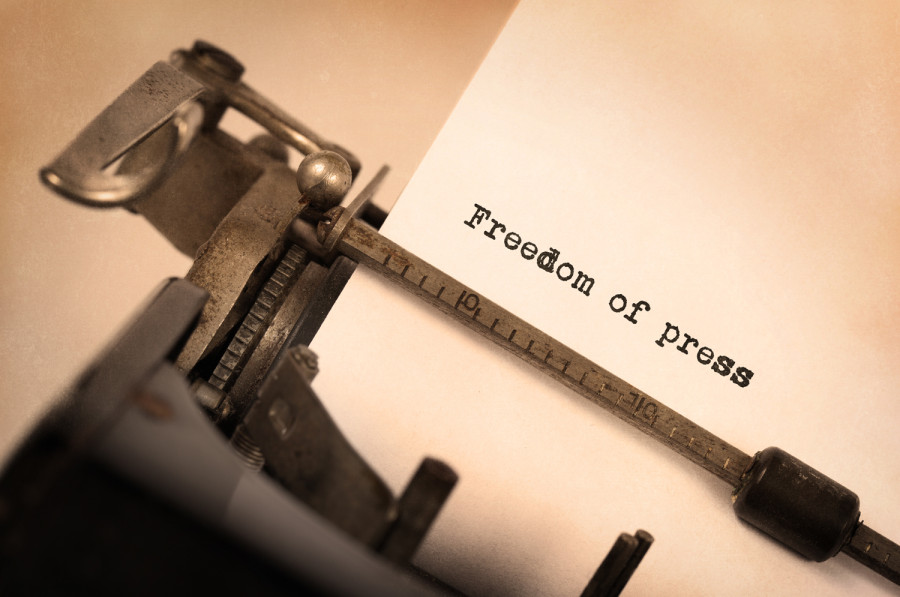National
Journalists and diplomats seriously concerned over Chinese embassy statement
The Chinese embassy’s statement objecting to an article published by the Post is against press freedom and breaches diplomatic protocol, they say.
Anil Giri & Tika R Pradhan
Nepal’s media fraternity and proponents of a free press and freedom of expression have taken serious exception to a statement by the Chinese embassy in Kathmandu regarding an article published in The Kathmandu Post.
In its statement issued on Tuesday, the Chinese embassy not only objected to the article and the accompanying illustration published on the Post on February 18, but also identified the Post’s Editor-in-Chief by name, employed disparaging language, and went so far as to make a veiled threat of “further action.”
The Post had republished the article, titled ‘China’s secrecy has made the coronavirus crisis much worse’ by Ivo Daalder, a former US ambassador to NATO, which was originally published in The Korea Herald, a member of Asia News Network. The accompanying illustration showed Mao Zedong wearing a mask.
The statement, which was circulated to various media outlets via email, was also shared by Chinese Ambassador Hou Yanqi on Twitter, a social media platform that is banned in China.
Freedom Forum, a civil liberty group that advocates for free speech and media freedoms, issued a statement saying it is concerned about the Chinese embassy’s statement.
“The article is not hate speech. It was just the expression of opinion,” said Freedom Forum in its statement. “As Nepal is a democratic country, freedom of expression and press freedom are rights guaranteed by the constitution of Nepal. Hence, the Embassy of China releasing such a statement is unacceptable and also it is against the notion of press freedom.”
Earlier, on Wednesday afternoon, 17 editors of Nepal's dailies and online portals condemned the Chinese embassy statement and reminded the embassy that full press freedom is guaranteed by Nepal’s constitution.
“We respect the right of an individual or organisation to express their disagreement over materials published in the media,” the editors said in a statement. “But we disagree with the disparagement and threats issued by naming any particular editor. We condemn such an act.”
The statement is undersigned by Akhilesh Upadhyay, Ameet Dhakal, Arun Baral, Kiran Nepal, Krishna Jwala Devkota, Gunaraj Luitel, Narayan Wagle, Purna Basnet, Prakash Rimal, Prateek Pradhan, Prashanta Aryal, Basanta Basnet, Rajendra Dahal, Shiva Gaunle, Sudheer Sharma, Subhash Ghimire, and Hari Bahadur Thapa.
“Nepal's constitution has guaranteed full press freedom, and we are committed to exercising and protecting it,” they said.
According to the editors, the statement was not just against the spirit of press freedom but it also violated diplomatic decorum.
A former foreign secretary, who has also served as an ambassador, described the statement from a neighbouring country as “quite unusual”.
“If the embassy had any reservations about the published content, the Nepal government is the authorised entity to reach out to. The statement goes against diplomatic practices,” he said.
Several diplomatic missions in Kathmandu have expressed concern with government officials, political leaders, and the media fraternity about the Chinese embassy’s statement, according to at least four officials from the Home and Foreign ministries that the Post spoke to.
“Protesting against reproduced content that does not necessarily carry the official position of The Kathmandu Post, goes against full press freedom that is guaranteed by the constitution of Nepal,” one government official told the Post on condition of anonymity.
Former ambassadors too said that the statement breached diplomatic norms and went too far by naming the editor of the paper.
“Ambassador you crossed the diplomatic limitations. This is not acceptable by this country. Vienna convention does not allow you to threat media and Chief Editor. This is democracy Madame. You can use democratic tools for addressing your concern. Democracy is very important for us,” tweeted Vijay Kant Lal Karna, Nepal’s former ambassador to Denmark.
Another former ambassador told the Post while he believed that Nepal and China should refrain from commenting on each others’ internal matters, the statement went a step too far.
“We live in and practice different political and social systems, but we do not comment on the internal matters and politics of China,” Dinesh Bhattarai, Nepal’s former permanent representative to the UN in Geneva, told the Post. “That said, reprinting an article does not qualify as parroting any view.”
Others, including journalists, said that Nepal’s political culture was also to blame for the embassy’s statement.
“Perhaps it was the fawning politicians of Nepal that emboldened Amb. Hou Yanqi (@PRCAmbNepal) to castigate a KTM publishing house & its editor. This quick reaction from seniormost editors should make her (& the sending country) reconsider the importance of forbearance & civility,” journalist Kanak Mani Dixit said on Twitter, referring to the editors’ statement.
“Expressing disagreements with news and opinions published in the media are well-accepted practice. But just because it disagrees, an embassy issuing threat is undiplomatic, irresponsible and condemnable. Our political culture of kowtowing to embassies is also equally responsible for this situation,” said Rabindra Mishra, a journalist-turned-politician, on Twitter.
Some, however, questioned if the Nepali media was taking too many liberties and ignoring “cultural sensitivity”.
Bishnu Rijal, a leader of the ruling Nepal Communist Party, called the statement by the editors condemning the Chinese statement an “overreaction”.
“Over-reaction from editors is not expected. Whereas media are free to publish, then everyone has right to criticize. Being public entity, media must not be taken as private affairs,” Rijal wrote.
Journalistic bodies, meanwhile, pointed out that there is a proper way to express dissatisfaction with published content—through the Press Council.
The Federation of Nepali Journalists, an umbrella organisation of more than 13,000 journalists across the country, issued a statement expressing serious concern and directing the embassy’s attention to the Press Council.
“It’s condemnable that a diplomatic body is threatening a journalist through a statement,” said Ramesh Bista, general secretary of the federation, in the statement. “The Federation of Nepali Journalists calls on all concerned to respect constitutional rights.”
The federation’s vice-chair Bipul Pokhrel said that China used to stick to diplomatic decorum but this time, it had crossed the limit.
“There are many independent organisations of journalists here in Nepal to deal with such matters but issuing a statement naming the editor was wrong practice,” Pokhrel told the Post. “We cannot accept such harsh comments from the embassy regarding the practice of our journalism.”
The Nepal Press Union also condemned the embassy’s act of threatening the Post’s editor-in-chief.
“The union is clear that one can express dissatisfaction over the content of the newspaper and all concerned have the right to object. But we strongly condemn the embassy’s threat to the editor,” said Ajay Babu Shiwakoti, the union’s general secretary. “No citizen of the country who has been exercising press freedom and right to expression ensured by the constitution will agree with the language of the Chinese embassy.”




 22.9°C Kathmandu
22.9°C Kathmandu















